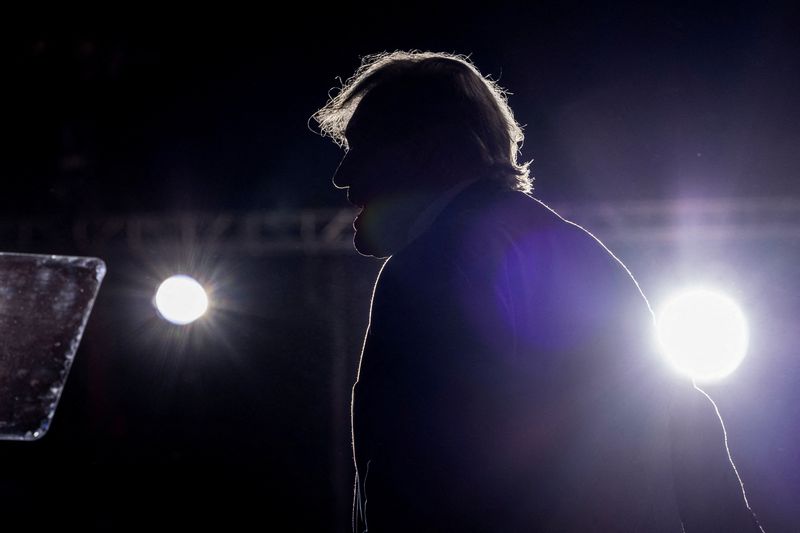By Luc Cohen and Karen Freifeld
NEW YORK (Reuters) - Donald Trump's family company is set to face a criminal trial on tax fraud charges in New York starting next week that could trigger fines and further complicate the real estate firm's ability to do business as the former U.S. president's legal woes mount.
The Manhattan district attorney's office in July 2021 charged the Trump Organization and its then-chief financial officer Allen Weisselberg with defrauding tax authorities by awarding "off the books" benefits to company executives since 2005, allowing certain employees to understate their taxable compensation and enabling the company to evade payroll taxes.
Weisselberg, who has worked for Trump for half a century, pleaded guilty in August to charges that he concealed $1.76 million in income. His plea agreement requires him to testify at the trial against the Trump Organization, which operates hotels, golf courses and other real estate around the world.
Jury selection is scheduled to begin on Monday in Manhattan state court.
Trump has not been charged in the case. But the trial of his namesake company now run by two of his adult children - Donald Trump Jr. and Eric Trump - comes as the Republican former president considers running again in 2024. Trump faces other investigations by federal and state prosecutors including ones into attempts to overturn his 2020 election loss and the removal of government documents from the White House when he left office.
The Trump Organization could face up to $1.6 million in fines for the three tax fraud counts and six other counts that were brought. Two of its subsidiaries - the Trump Corporation and Trump Payroll Corp - are the entities charged in the case.
Lawyers for the Trump Organization have claimed the case is a "selective prosecution" based on animosity by the prosecution toward Trump for his political views, though the judge overseeing it has rejected that argument. Manhattan District Attorney Alvin Bragg and his predecessor who began the investigation, Cyrus Vance, are Democrats.
The company's lawyers also said prosecutors presented no evidence to the grand jury that returned the indictment that the Trump Organization evaded payroll taxes. They also said that prosecutors were seeking to punish the company because "a handful of its officers allegedly failed to report fringe benefits on their personal tax returns."
OFF-THE-BOOKS PAYMENTS
The fact that the Trump Organization kept making off-the-books payments for so many years could help prosecutors show it intended to violate tax laws, a key element of proving its guilt to the jury, said Bridget Crawford, a law professor at Pace University in New York focusing on income tax and corporations.
"Failure to report once might be a mistake. Failure to report over a period of time is fraud," Crawford added. "If you know of your tax obligations - which all experienced and savvy people do - and consciously disregard them, that is intent to defraud the government."
The criminal case is separate from the civil fraud lawsuit filed by New York state Attorney General Letitia James on Sept. 21 against the Trump Organization, Trump and three of his adult children, accusing them of overstating asset values and Trump's net worth to get favorable bank loans and insurance coverage.
Trump has called the civil suit brought by James as well as the charges being pursued by Bragg politically motivated.
James, a Democrat, is seeking to recoup $250 million, remove the Trumps from power at the Trump Organization, prevent it from buying commercial real estate in New York for five years and install an independent monitor to oversee its operations.
The Manhattan District Attorney's office is limited to seeking financial penalties, noted Marc Scholl, a former prosecutor in the office. A corporation can be fined up to $250,000 for each tax-related count it faces and up to $10,000 for non-tax counts, Scholl added.
The trial could make other companies wary of dealing with the Trump Organization regardless of any punishment the judge may ultimately hand down, said Miriam Baer, a professor at Brooklyn Law School specializing in corporate compliance and white collar crime.
The Manhattan district attorney's office has brought criminal cases against high-profile companies but trials are rare.
"It casts a pall of uncertainty over the company," Baer said, adding that many companies seek to resolve allegations of criminal wrongdoing before charges are even brought through agreements with prosecutors.
WEISSELBERG'S PERKS
Prosecutors said Weisselberg received perks from the company in lieu of some salary, including rent for a Manhattan apartment, lease payments for two Mercedes-Benz vehicles and tuition for relatives, with Trump signing the tuition checks. They added that Weisselberg also used company money to buy personal items like televisions and carpets, and falsely told tax authorities he was not a New York City resident.
Weisselberg avoided $900,000 in taxes by failing to declare those perks as income, and collected $133,000 in refunds he did not deserve, prosecutors said.

Two other Trump Organization employees received compensation in the form of lodging and car leases, prosecutors said.
There is nothing illegal about receiving non-monetary compensation from an employer, but those benefits must be reported as income, with the exception of small perks like free coffee at the office, said Jay Soled, a lawyer and accounting professor at Rutgers Business School in Newark, New Jersey.